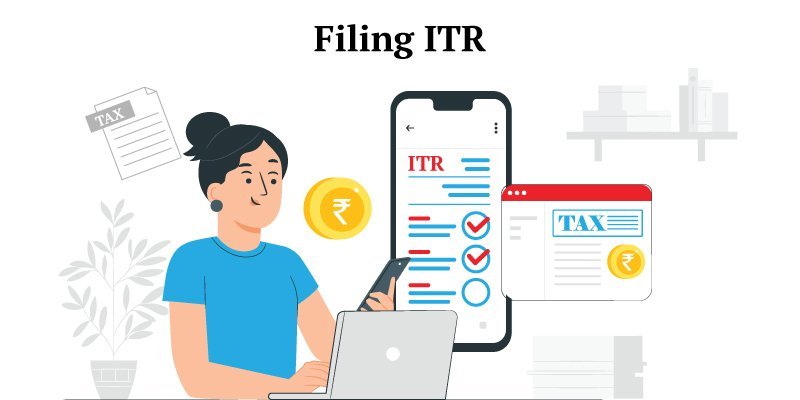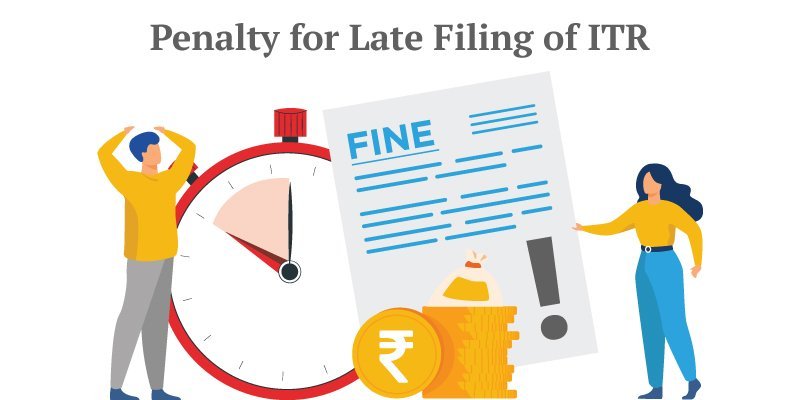Penalty for not Filing ITR: A person's earnings for a fiscal year are detailed in an income tax return, which is a condensed document. the cost of not reporting an ITRP Every year, taxpayers are required to file their returns with the income tax department and pay any taxes due. For various income brackets, the income tax department has varied tax rates.
Additionally, the government routinely reminds people to file their income tax forms. Fines and penalties may be assessed if you fail to pay your obligations or fail to file an ITR.
We can obtain What the Cost of Not Filing an ITR?
What is ITR and it’s Importance? (Penalty for not Filing ITR)
You must submit an income tax return (ITR) to the government. Your income, investments, and amount of owed taxes are disclosed to the government in this return.
The Income Tax Act of 1961 requires it to be filed annually by people and businesses that meet specific income requirements.
ITR’s main purpose is to give the government a record of a person’s earnings and tax payments. It aids in tax collection and is used as documentation of income when applying for loans, visas, and other financial services. penalty for failing to file an ITR if payment is late
What is the significance of ITR filings?
You must file tax returns as a law-abiding citizen. The advantages of doing so are as follows:
- Three years’ worth of tax returns are required when you apply for a loan to pay for a home, automobile, or medical care.
- Your tax return must be submitted if you want a rapid visa acceptance.
- A tax clearing certificate (ITR) is required by Section 281 of the Income Tax Act if you engage in overseas or high-value transactions, such as the transfer of assets.
- You can apply for tax refunds if you are eligible by filing tax returns.
- Tax return records are crucial since they verify your income and address.
- If you want to work on any government projects, your most recent income tax returns are an essential source of information. Regular ITR filing entitles you to offer applications.
- Companies and individuals can avoid paying tax fines and interest by filing an ITR.

Penalties for Not Filing an ITR:
In India, every taxpayer has a significant obligation to file an ITR. It is a prerequisite for acquiring loans, visas, and other financial services as well as a legal requirement. ITR failure can have serious repercussions, including financial and legal penalties.
In this blog post, we’ll talk about the penalties for not filing an ITR, including interest fees on the existing tax balance as well as penalties for filing an ITR late and penalties for not filing an ITR at all.
- If a taxpayer fails to submit their ITR by the deadline, they may be subject to a penalty of up to Rs. 10,000. The length of the delay and the taxpayer’s overall income both go into the penalty amount. For instance, the fine is Rs. 1,000 if the taxpayer’s total income is less than Rs. 5 lakhs. The penalty rises to Rs. 10,000 if the ITR is submitted after the deadline of the relevant assessment year.
- ITR Non-Filing Penalty: A taxpayer who fails to file an ITR may be subject to a penalty of up to Rs. 10,000. The tax obligation is in addition to this penalty. The entire penalty amount will be Rs. 30,000 (Rs. 20,000 tax liability + Rs. 10,000 penalties), for example, if the taxpayer’s total income is Rs. 5 lakhs and the tax liability is Rs. 20,000.
- Interest Charges on Outstanding Tax Amount: If a taxpayer doesn’t pay their tax obligation, they will be required to pay interest at the rate of 1% each month. From the ITR filing deadline to the actual payment date, this interest is calculated. If the taxpayer does not pay the tax debt or pay the Penalty for Not Filing an ITR for a lengthy period of time, the interest charge may rise.
What Is the Taxpayer-Wise Penalty for Filing Income Tax Returns Late or Not at All?

- The kinds of taxpayers and the fines they incur for failing to file their income tax returns by the deadline are listed below.
- Salaried People: Three types of people are taken into account here.
- Under 2.5 lakhs in total annual income No fine (no ITR fine for no return).
- Annual total revenue under Rs. 5 lakhs: Maximum fine is limited to 1,000.
- Over 5 lakhs in total annual income: up to 10,000
- Businesses: up to 10,000
- Individuals who are self-employed: up to 10,000
- Senior Citizens: Only senior citizens who meet the following requirements are subject to the aforementioned penalty for failing to file an ITR under Section 234F.
- Having a total annual income of more than 3 lakhs and being between the ages of 60 and 80.
- Having a total annual income of more than 5 lakhs and being older than 80.
- There are many people right now whose annual gross salaries do not surpass the taxation threshold. If you fall into this category, you might be wondering how a late ITR filing penalty might effect you.
Can You Go to Jail for Failing to File a Tax Return?
Up until this point, many of the conditions discussed here dealt with what happens if an ITR is not submitted by the deadline. Taxpayers will be notified by the Income Tax department under Sections 142(1), 148, or 153A if they completely neglect to file their income taxes for an assessment year.
The concerned person may be prosecuted for tax evasion under Section 276CC of the Income Tax Act if the ITR is not filed even after taking these steps.
The details of incarceration are as follows.
- For alleged tax evasion of more than Rs. 25 lakhs, there is a penalty for failing to file an ITR as well as a minimum 6-month sentence that may be increased to 7 years in prison.
- For other offences: The prescribed punishment plus a minimum of three months’ imprisonment, with a maximum sentence of two years.